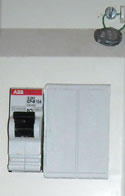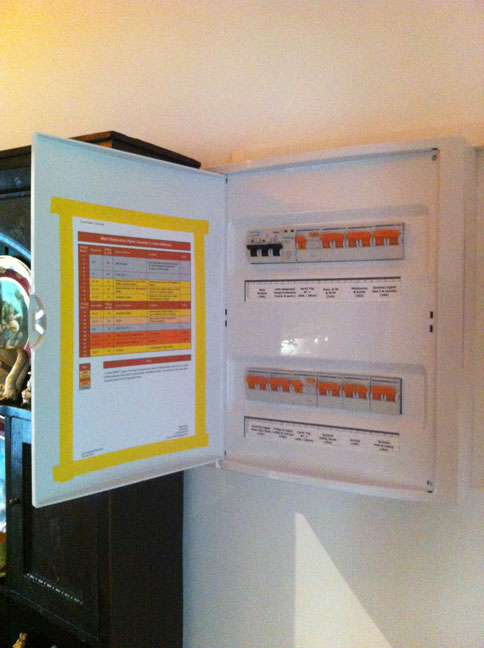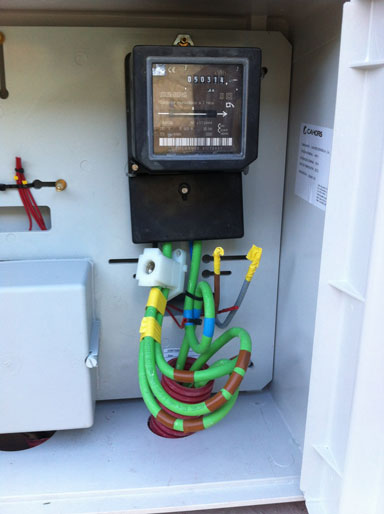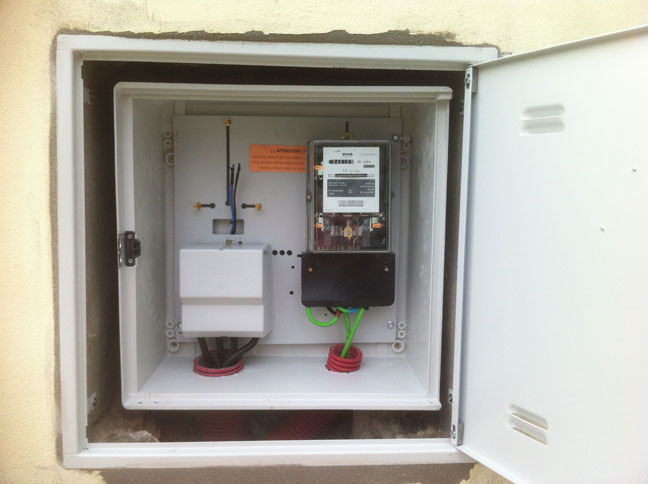Trips, Tips and Tricks
Do you suffer power cuts on a regular basis, and wonder why your neighbours still have electricity? Well, before contacting your supply company or your ‘shockingly good’ electrician here are a few tips and tricks that might help. First of all, acquaint yourself with your fuse box, before your next power cut! … you may be glad you did! Do you recognise any of these circuit breakers?

Hopefully you identified most of them! But what do they all do? And what can you do if any of these breakers trip (i.e. switch OFF). Read on to find out!
The next time you lose power in your home, go to the fuse box, with torch if necessary and follow these tips and tricks!
MAIN BREAKER – Isolates live and neutral on incoming supply, provides general protection from overload and short circuits.
Trick: if this trips (switches OFF) and cannot be reset, leave alone for a few minutes and try switching ON later. If it is hot or smells bad, urgent attention is required!
SURGE LIMITER – Reduces risk of damage to electronic equipment following a surge on the supply or lightning strike to property or supply cable.
Tip: if a ‘tag’ appears in the small window, the unit needs replacing!
RCCB – (Residual Current Circuit Breaker) or ‘Earth Trip’ protects you from the risk of electric shock in the event of a wiring problem or fault on an appliance.
Tip: test every month by pressing the ‘Test’ button, this should provoke a trip (switches OFF) which proves the device is working, then switch it ON again.
Trick: if it trips on its own, try to identify which circuit or appliance is at fault, by first unplugging everything. Switch OFF all MCBs (see below). Switch RCCB back ON. Then by this process of elimination, switch ON each MCB one at time, in turn, until the RCCB trips again. Leave this MCB OFF and switch ON all the rest to regain power.
Trick: if it trips on a regular basis or will not reset, there is a genuine fault or something has got wet, quite likely with all the heavy rain recently! Check all outdoor lights, gate motors, swimming pool, well pump etc.
Miniature Circuit Breakers – (MCBs) provide overload and short circuit protection for individual circuits and ‘heavy load’ appliances, e.g. ceramic hob.
Tip: may be single-pole (isolates live only) but must be double-pole, same as Main Breaker, to comply with current wiring regulations. Consider upgrading!
Trick: if it trips, try unplugging all appliances on that circuit and switch ON MCB.

ICP – (Interuptor Control Potencia) is the ‘current limiter’ fitted and sealed by Endesa, the rating of which depends on the ‘potencia contratada’ on your electricity contract.
Tip: ensure your ‘potencia contratada’ (power contracted in Kilowatts) is adequate for the appliances used in your home, otherwise your ICP will continue to trip out (switch OFF)!
Tip: if your installation is very old it may not have an ICP. Electricity supply companies are now legally obliged to ensure ICP’s are fitted and maintained in working order and are currently writing to consumers for whom they have no record of an ICP being fitted. Be warned!!
Tip: if you want to upgrade your contract and have no ICP, work will be required to upgrade the fuse box and supply cable from your meter. The meter enclosure itself may need replacing and possibly the supply cable to it. You may also require a ‘boletín’ certifying your installation.
Tip: never remove or bypass the ICP, this is illegal and potentially lethal!
Trick: if the ICP trips on a regular basis then reduce the number of appliances operating at any one time or upgrade your contract with the supply company.
Other Tips to maintain ‘luz’:
- Find out the energy rating (in Kilowatts) of all your appliances, you need this information to determine correct energy rating (potencia contratada) and tariff. If you are planning to install air conditioning, ceramic hotplate or other electrical appliance, check your ‘potencia contratada’ is sufficient, if not contact your supply company or Spanish speaking electrician to request an upgrade.
- Ensure all wall sockets, light switches and plugs are in good condition.
- Use correct plugs for appliances (flat 2-pin plugs for unearthed double-insulated appliances, round 2-pin for all earthed appliances).
- Always replace damaged flexes and extension leads, do not ‘tape over’.
- Do not use multi-adaptors, have extra sockets fitted where required.
- If children about, fit sockets with child-protection safety covers.
- Do not use electrical appliances in the bathroom unless specifically approved for this purpose.
If you are concerned about problematic trips, your electricity supply or contract then contact me. I can audit your installation, perform load testing and advise you on most suitable tariff. I work with the Endesa partners in the Guadalhorce Valley, should any major works or ‘proyecto’ be necessary.
2 March 2010



